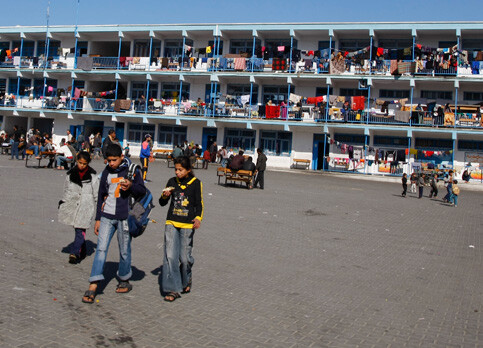Gaza Strip 19 January 2009

UN-administered schools are now housing thousands of Palestinians displaced by Israel’s bombardment of Gaza. (Eman Mohamed)
15 January 2009
“I could not leave my house, it’s too priceless to me — it’s home! Although I could hear the missiles hitting the house next door, kids in the family were frightened and wouldn’t stop crying. Still we managed to hold on until they destroyed our cousin Sadlah Matar Abu Halemeh’s causing the death of his nine-member family. All were killed and no one survived — then we decided to leave!”
These were the words of Naima Abu Halemeh who moved into the al-Shati school in Gaza City after her husband, Zhaar, and son, Muhammad, were injured while they were trying to evacuate their house in Beit Lahia’s al-Siafa neighborhood in the northern Gaza Strip. She quickly dried her teary eyes when her cousin, Eid, said that “we won’t cry because we will be back soon there soon. We just feared for the lives of our kids; it’s not much better over here, more than 30 members of my family sleep in the classroom which we used as a bedroom when we moved in the school.” While he boiled water, he added, “we couldn’t get a bath for eight days! Can you believe how miserable our lives have become? My son Muhammad always wets his bed at night, but I can’t help him. What can I say — don’t be scared? I’m scared myself!”
Mona Abu Halemeh, 30, held her newborn baby, Muhammad, and expressed her anger and disappointment, asking “How many rockets can you see my new born baby firing? None! Why should he suffer then? I just had an operation and am now moving from place to place. Instead of having a comfortable bed I’m sleeping on the floor with my baby! That’s so unfair!” Her sister Manal added, “My daughter Shahad doesn’t smile like she used to. She stays close to me every time she hears a bomb and refuses to eat well, and there isn’t any good food to eat anyway, for that matter.”
Outside the converted classroom, Linda Abu Halemeh, seven, was waiting for water to come out of the tap and watching other kids playing games. She explained, “I wish I can go back home, I don’t like it here!” Mansura Abu Halemeh, 53, overheard the young girl’s comment as she was washing her family’s clothes. She nodded sadly, stating that “even the little girl is fed up with this situation, poor children, they did nothing to deserve this kind of cruel life but what can you do? To tell you the truth I don’t have kids of my own but I can see my brother’s children and how much they suffer every night to sleep while the horrifying sound of bombs and explosions wake them up every a couple of minutes. [At the school shelter] it’s not much different from al-Siafa where we used to live, its only a little bit safer although I doubt even that!”
Linda’s cousin, Baraa, stood nearby but was unwilling to play with the other children. Sitting on one of the desks outside, she said that “Daddy brought us here after the Israelis tried to kill us. I don’t have my doll anymore. I told him to go back and get it for me but Mommy told me he would die if he did. I don’t want Daddy to die, I just want my doll back!” She added, “I don’t like school. I even hate it more now! Can you go back to our house and tell the Israelis I want my doll?”
Sitting at the desk next to Baraa, Mahmoud Abu Sultan was playing a game with his other brother. His mother, Najwa, explained that “We moved to the school and couldn’t stand it before. I told my husband we can stand the air raids but I’m always worried about my sons and can hardly watch them all while playing so I end up ordering them not to play. They are no longer normal kids, they aren’t used to all of this misery, I feel helpless when I see them sad now since I can’t help it.”
While most children stayed close to their parents, some volunteers, like Samah al-Nimnim, tried to create activities for them to enjoy. Muhammad Abu Soltan, 12, could only watch without being able to join since his responsibility was to sell candies to the people at school after his family’s supermarket in the al-Salateen neighborhood in southern Gaza was destroyed by Israeli shelling. They could only retrieve a few boxes of what was left. He said, “I just sit here and wait for someone to come and buy anything so me and my family can have some money and get out of here soon. Well maybe not soon but I wouldn’t want to play anyway. Who would?”
Eman Mohammed is a Jordanian-Palestinian freelance photojournalist and reporter based in the Gaza Strip since 2005.
Related Links





